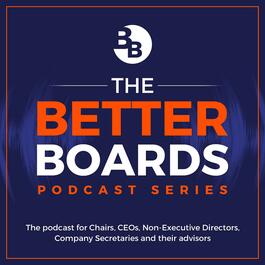
Governance Experts as Non-Executive Directors: A perfect fit? | Lyn Colloff, Company Secretary
Send us a text Governance experts and Company Secretaries offer a prime, yet often overlooked, talent pool for high-quality Non-Executive Directors. But what makes them excel on Boards? In this podcast, Dr Sabine Dembkowski, Founder and Managing Partner, speaks with Lyn Colloff, a Fellow of the Chartered Governance Institute with 40 years’ experience in governance, risk, and compliance across listed and regulated sectors. Most recently, she served as Company Secretary and Head of Governance, Risk, and Compliance at Wincanton plc—a FTSE 250 supply chain leader and Executive Team member. Now, she runs her own consultancy, providing governance training and board support, and seeks Non-Executive Director roles. “These individuals are used to exercising independent judgment, which is an important concept for a Non-Executive Director.” Lyn believes Company Secretaries excel as Non-Executives because of their experience and discernment. They bring governance, strategy, and risk expertise, as well as deep insight into boardroom dynamics. Their knowledge of codes, frameworks, and regulations allows them to translate complexity into actionable advice and inform strategic planning. “There’s a case for making sure you’ve got all the skill sets you need in the boardroom, including that big governance piece.” While Lyn acknowledges that CFOs and CEOs dominate Non-Executive roles, she sees opportunities for others. In smaller FTSE, charity, and sport groups that might not have their own Company Secretary, appointing Company Secretaries as Non-Executives helps bring governance expertise to the boardroom. “If you fill the boardroom with just CEOs or ex-CEOs and CFOs, you’re not getting diversity of thought.” As people work longer or shift to a give-back mentality, many want a seat at the table. Lyn asserts that Board Chairs must ensure diverse backgrounds and experiences to achieve a healthy, functioning board. “I don’t accept that Company Secretaries lack financial experience.” Boards often seek P&L backgrounds, but Lyn maintains that Company Secretaries with executive roles possess budgetary acumen and advise remuneration committees. Their financial understanding often spans the whole organisation, not just a single division. “Many in the COSEC space deeply understand how to safeguard shareholder and stakeholder interests.” What sets Company Secretaries apart is their record in strategic planning, transformation, and aligning stakeholders. They’re tuned into the strategic process, understand sector and political environments, and use this knowledge to inform future planning. Board Chairs should carefully identify gaps in the Board’s views and background, and consider whether a Company Secretary could address them. Three key takeaways for effective boards: 1. Be open-minded about the skill sets that governance professionals and Company Secretaries bring to the boardroom. 2. Consider all Board members’ skills and fill gaps with versatile contributors. 3. Identify the risk horizon and understand what’s likely to impact strategy in the coming years, ensuring the Board can address these challenges. Join The Better Boards Community We’d love to connect! To join our community, discover our approach, or share your ideas on The Better Boards Podcast, contact us at info@better-boards.com. If you would like to become part of the Better Boards community, learn about our distinctive approach and explore opportunities to work with us or contribute to The Better Boards podcast series, get in touch at info@better-boards.com. We love to hear from you.
From "The Better Boards Podcast Series"


Comments
Add comment Feedback